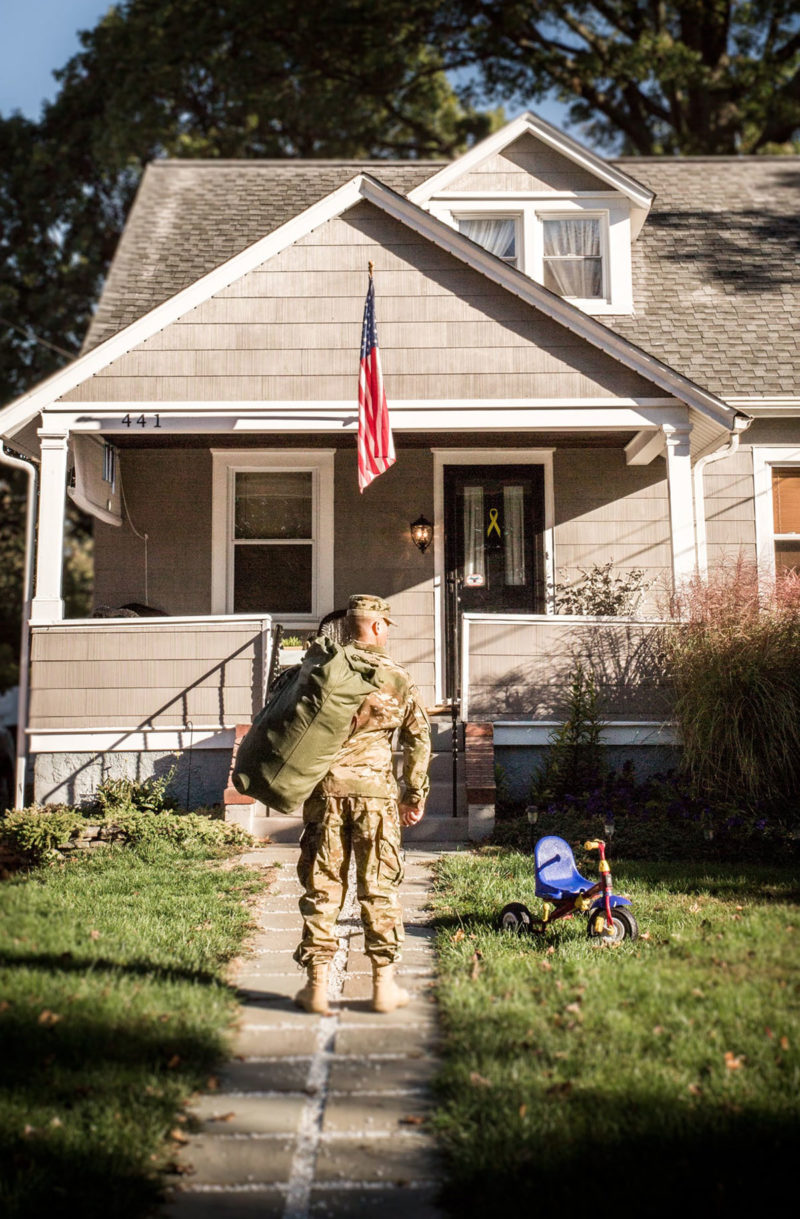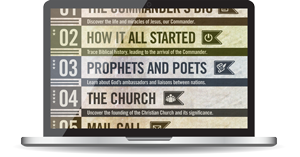Time for Joyful Dedication
Week Summary
What actions can your family do to show your dedication to one another and to God?
Dedication starts in the heart, but we carry it out with action. The people of Jerusalem made a binding agreement with God to follow Him whole-heartedly. Agreements help us focus. They are a means to express our love. This week we journey to identify symbols of your renewed dedication to your marriage, your family, and God in this season of reintegration.
About This Journey
Reintegration is hard: it messes with rhythms and feels uncomfortable. “Reunited and Resilient” tells the story of how God stirred a king to change the trajectory of a nation. Follow along as God shows us how He can also stir your family’s hearts to reach for restoration as you journey toward reintegration following deployment.
This Week's Readings
Your Family Name
Read
So the wall was finished on the twenty-fifth day of the month Elul, in fifty-two days. And when all our enemies heard of it, all the nations around us were afraid and fell greatly in their own esteem, for they perceived that this work had been accomplished with the help of our God.
-Nehemiah 7:5-6Reflect
Recently I came across some old military orders my husband had received for a deployment. Not only was his name listed, there was a long list of others who would be deployed with him. His name was on this official record meant more than being one of many to deploy. The list was used to identify those who had access to certain military benefits because of deployment.
Chapter 7 of Nehemiah focuses on a document of names. I know—another list of names, right? The names were representative of lives and history, and being on the list carried with it access to certain benefits as the chosen people of God.
After Nehemiah completed the work on the wall, he turned his attention to the people within the wall. He set out to gather a genealogy of the people to see where different families were living and place some of them in Jerusalem. In order to develop economically, socially, and spiritually, the nation needed people. His research led him to an important genealogical list. He found a record of families who had returned to Jerusalem during the first redeployment. In fact, these names match the names listed in Ezra 2. Nehemiah used the list to remind the people of their identity as a nation. He encouraged them to live their lives in light of their identity.
We can learn a lot about God by looking at the list of names in Nehemiah 7. First, the names listed tell us that God cares about individuals. The names may mean nothing to us, but they sure mean something to God. He knows your name and he sees you with eyes of love and concern.
Second, God cares about families. The list includes some family groups. God has a purpose and a plan for your family. We often question and want to know God’s will for the individual, but have you thought about God’s will for your family?
Finally, the names show that through all the challenges the exiles experienced, God did not forget them. He returned them to their home and reestablished their purpose. Returning to Jerusalem was not easy, but they were reminded that God had made a promise to their forefather Abraham to give them the Promised Land and that they would be a blessing to the nations around them. God remembered them. This listing of their history reoriented them to both their birthright and their calling.
Note too that we find this listing in God’s Word and not just in the administrative records of a nation. It emphasizes the importance God places on individuals and family units.
Respond
In what ways can you strengthen and reestablish the bonds with your extended family, following deployment? What are the challenges? What are the blessings?
Prayer
Lord, because of your great love for me I can say, “The lines have fallen for me in pleasant places; indeed, I have a beautiful inheritance” (Psalm 16:6). Amen.
Joy and Strength
Read
And Nehemiah, who was the governor, and Ezra the priest and scribe, and the Levites who taught the people said to all the people, “This day is holy to the Lord your God; do not mourn or weep.” For all the people wept as they heard the words of the Law. Then he said to them, “Go your way. Eat the fat and drink sweet wine and send portions to anyone who has nothing ready, for this day is holy to our Lord. And do not be grieved, for the joy of the Lord is your strength.”
-Nehemiah 8:9-10Reflect
Pictures of new parents with their brand new babies—through birth and adoption—have come across my Facebook news feed this week. The joy on the faces of these parents is undeniable. The little one is not able to respond in kind. The tiny ones are struggling to grow accustomed to their harsh new environment. Their strength to survive and thrive often comes from the joy of the parents. Parental joy motivates a parent to protect, provide, and nurture their child’s full potential.
In Nehemiah 8, Ezra read God’s Word to the community. As the holy words poured forth, the sound of weeping rose among those gathered. The people grieved as the light of truth dawned on them. They realized their sin of disobedience, neglect, and lack of commitment as God’s people. Instead of chastising them, Ezra and the priests told the people not to grieve because “the joy of the LORD is [their] strength.”
Many years prior, the prophet Zephaniah exhorted the people to rejoice at the restoration of Jerusalem (Zephaniah 3:14–20). He proclaimed that the Lord would be in their midst and he would rejoice over them. Now Nehemiah encouraged the people to rejoice in knowing God’s delight in them was more significant than their failure to follow the law. God’s good pleasure had stirred the heart of the king who allowed the Jews to return to their land to reconstruct their temple, to rebuild their city wall, and now to restore their people. God took great delight in this restoration process. The people could be strong because God took joy in them.
As you put your trust in the Lord, you will receive the strength that comes from our heavenly Father. Trusting in him results in confidence that he will provide for your family’s needs, protect your family relationships, and help your family accomplish what you cannot achieve on your own. Let the joy of the Lord give you strength to move through the stages of reintegration and beyond.
Respond
Ezra reminded the returning exiles that their joy was to be in God’s provision for them. How have you and your family experienced joy in the Lord during deployment? What encouragement do you find in the words of Zephaniah 3:14–20?
Prayer
Father, my source of strength is not in independence, self-discipline, talents, or abilities. My strength is not in my husband, children, or friends. My strength is not in national superiority or military might. My strength is in you. Let me live in daily recognition that my help comes from you. Amen.
Build a Booth
Read
On the second day the heads of fathers’ houses of all the people, with the priests and the Levites, came together to Ezra the scribe in order to study the words of the Law. And they found it written in the Law that the Lord had commanded by Moses that the people of Israel should dwell in booths during the feast of the seventh month, and that they should proclaim it and publish it in all their towns and in Jerusalem, “Go out to the hills and bring branches of olive, wild olive, myrtle, palm, and other leafy trees to make booths, as it is written.” So the people went out and brought them and made booths for themselves, each on his roof, and in their courts and in the courts of the house of God, and in the square at the Water Gate and in the square at the Gate of Ephraim. And all the assembly of those who had returned from the captivity made booths and lived in the booths, for from the days of Jeshua the son of Nun to that day the people of Israel had not done so. And there was very great rejoicing.
-Nehemiah 8:13-17Reflect
A tongue-in-cheek joke told during overseas assignments goes like this: “Why do U.S. military serving overseas smile more than the local nationals? They have a DEROS.” Military life is one of the best reminders of the temporary nature of life. A deployment will end, a PCS will happen, an assignment will change, a neighbor will move—and then this cycle will begin again. If you are unhappy with a person, a house, or a situation at one assignment, just smile and wait for the inevitable change that will come.
I know military wives who have a hard time viewing life through the lens of temporary. They struggle to adjust to the constant change. I know others who embrace the opportunity to experience new things.
God’s Word reminded these Jews of the temporary nature of life. They renewed the celebration of the Feast of Booths by building temporary shelters that replicated the tents of their ancestors’ wilderness wanderings with Moses. They rejoiced together as a community over the grace of God that kept their families intact during the years of wandering. God not only sustained them, but also returned them to the land of promise.
A temporary view of life is a biblical view of life. This is not a morbid or melancholic focus. It is realistic, and for the Christ-follower it is hopeful. We have an eternal view. This world is not our permanent home. Just as the Feast of Booths reminded the Jews of God’s provision and care in a transitional state, we can be confident the Lord is with us and will help us through all our transitions. Reintegration is an important transition, but for a career military family it is one of many temporary transitions.
Here’s an idea. In your mind, build a booth for reintegration to remind you God is with you. Later you may want to build a PCS booth, a new assignment booth, or a deployment booth. Each time, reflect with your family on how God helped you through the last transition and how he will help you through this one.
Respond
What can we learn about the temporary nature of life from Ecclesiastes 3:11 and James 4:13–16? Which military experiences remind you of the temporary nature of this life?
Prayer
Lord, give me an eternal perspective. Give me a grateful heart and a joyful spirit in this temporary life. Help me make the most of every opportunity. Amen. (See Colossians 4:5)
Sign on the Dotted Line
Read
“Now, therefore, our God, the great, the mighty, and the awesome God, who keeps covenant and steadfast love, let not all the hardship seem little to you that has come upon us, upon our kings, our princes, our priests, our prophets, our fathers, and all your people, since the time of the kings of Assyria until this day.”
-Nehemiah 9:32“Because of all this we make a firm covenant in writing; on the sealed document are the names of our princes, our Levites, and our priests.”
-Nehemiah 9:38“We will not neglect the house of our God.”
-Nehemiah 10:39bReflect
Renewal of vows is the focus of Weddings for Warriors. The nonprofit organization, founded in Savannah by Becky and James Byous, seeks to celebrate military marriages that remain firm despite the challenges. Each year, hundreds of volunteers provide their services and supplies to help military couples remember the priority of their marriage. I have never attended a renewal of marriage vows, but I can imagine it is a meaningful and moving event. Family members publicly vowing to love and value one another is powerful.
Chapter 10 of Nehemiah reads almost like a renewal of vows. As a nation, the Jewish people looked back to previous spiritual journeys. Together, they vowed total allegiance to what God said to them through the covenant made with Moses, “to follow the Law of God … and to obey carefully all the commands, regulations, and decrees of the LORD our God.” The covenant was both a personal and corporate commitment that people signed, sealed, and recorded. They publicly testified to their neighbors that they were presenting themselves afresh to God. This covenant held specific and precise promises because true renewal cannot succeed on sweeping statements and vague declarations. This covenant got to the nitty-gritty details of marriage, money, and worship.
The people of God purposed to make their commitment more than just a new desire; they purposed to show their commitment through renewed action. This was an opportunity to start fresh and get it right—to make changes and adjustments.
A renewal of vows can be lovely and meaningful, but is not necessary to renew the commitment you and your family have for God and for each other. In what ways do you desire to start fresh in your commitment to one another?
Respond
Ezra reminded the returning exiles that their joy was to be in God’s provision for them. How have you and your family experienced joy in the Lord during deployment? What encouragement do you find in the words of Zephaniah 3:14–20?
Prayer
Father, my source of strength is not in independence, self-discipline, talents, or abilities. My strength is not in my husband, children, or friends. My strength is not in national superiority or military might. My strength is in you. Let me live in daily recognition that my help comes from you. Amen.
A Walk Around the Wall
Read
Then I brought the leaders of Judah up onto the wall and appointed two great choirs that gave thanks.
-Nehemiah 12:31aAnd the joy of Jerusalem was heard far away.
-Nehemiah 12:43bReflect
Read Chapter 12 closely and get a picture of Nehemiah as an impressive orchestrator. The description of music and choreography might rival a wholesome Super Bowl halftime show. The grand display of synchronized movement did not overshadow the unrestrained joy of the celebration. The returning Jews dedicated this day to giving thanks to God for his provision and his goodness. The city was rebuilt and would now be dedicated as a place where God would be worshipped, followed, and made known.
Similar to the way military leaders today proudly conduct a ceremonial inspection during a change of command, Nehemiah took city leaders on a walk around the wall. This was the wall that enemies said could not hold a fox (Nehemiah 4:3). Now choirs marched atop in song. This was the wall naysayers said could not be rebuilt. Now leaders of the city stood on top for inspection.
Friend, you may have thought your family would not survive deployment—but you did. You may think your family cannot survive reintegration—but you can. By the help of the Lord, your family can bring others to the top of your rebuilt wall to show what you can accomplish through faith in God. Will you steward the opportunity you have as a military family to be an example of God’s faithfulness?
A note of caution: Chapter 12 celebrates the accomplishment of rebuilding. Unfortunately, Chapter 13 reveals that the people did not follow up their celebration with a continued commitment to serve God. As life went on and Nehemiah returned to Persia, the people of Jerusalem became lax in their commitment. As you complete this thirty-day journey of hope, celebrate the good God has done and is going to do in your family, and be determined to keep your commitments to your family and to the Lord.
Respond
If you have ever been involved in a dedication for a marriage, baby, military, or church building, reflect on what makes such a ceremony special and significant. Consider planning a mini-family reunion or a special meal with friends and families to celebrate God’s goodness to your family.
Prayer
Lord, thank you for your sustaining grace and mercy. Help my family to be surrendered to your constant work in our lives—as individuals and as a family. Keep us humble and gracious in our interactions with one another, and help us be an example of what you can do in and through a family committed to serving you. Amen.
Resources & Info
Resources to help you and other military wives in your community.
Are you enjoying these resources?
Sign up now to save your Journey progress and your favorite Segments.
Your download is being prepared.
- Small Group Resource: Deployed 2 - Leader's Guide
- Small Group Resource: Deployed 2 - Participant's Guide



